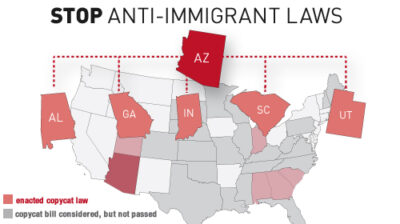
Utah Coalition of La Raza v. Herbert
What's at Stake
Utah was one of five states to pass anti-immigrant laws in 2011. The Utah state legislature approved HB 497 in March, 2011 which, among other provisions, authorized local law enforcement officers to verify the immigration status of individuals they stop, made it a crime to transport or harbor undocumented immigrants, and allowed for the warrantless arrest of individuals an officer has reasonable cause to believe are subject to federal immigration deportation orders.
Summary
In May 2011, the ACLU filed suit in U.S. District Court challenging the Utah law, claiming that it unlawfully interferes with the federal government’s sole authority over immigration matters; that the “show me your papers” provision violates the Fourth Amendment ban against unreasonable search and seizure; and that it violates the constitutional right to travel freely throughout the United States.
The District Court temporarily blocked major provisions of the discriminatory law from going into effect pending further deliberation. Several prominent law enforcement officials in Utah, including the Salt Lake City Police Chief, opposed the law because it undermines cooperation between local police and immigrant communities.
In June, 2014 the District Court issued its preliminary injunction ruling striking down key provisions of the law, including those that allow for warrantless arrest based solely on suspicion of immigration status and the harboring provision that made it a crime to assist undocumented immigrants in everyday activities like driving them to work. The court also put strict limits on the “show me your papers” provision, ruling that it does not authorize police to stop or detain an individual simply to verify his or her immigration status.
In a settlement announced by the ACLU in November of 2014, the State of Utah agreed to permanently scrap key provisions of the law. The settlement permanently blocks the provisions that would have authorized warrantless arrest and prohibited harboring of undocumented immigrants. In addition, under the terms of the settlement, the state’s infamous “show me your papers” provision is severely restricted, making it clear that police are not allowed to stop or detain someone simply to verify their immigration status or transport them to federal officials based merely on suspicion of unlawful presence.
Know Your Rights: SB1070 Supreme Court Ruling and Utah’s Anit-Immigrant Law
%3Ciframe%20class%3D%22media-youtube-player%22%20id%3D%22media-youtube-8gyy7ifq6y%22%20width%3D%22576%22%20height%3D%22324%22%20title%3D%22Know%20Your%20Rights%3A%20SB1070%20Supreme%20Court%20Ruling%20and%20Utah%27s%20Anti-Immigrant%20Law%22%20src%3D%22%2F%2Fwww.youtube.com%2Fembed%2F-8gyY7ifq6Y%3Fwmode%3Dopaque%26amp%3Benablejsapi%3D1%26amp%3Bmodestbranding%3D1%26amp%3Bplayerapiid%3Dmedia-youtube-8gyy7ifq6y%26amp%3Brel%3D0%26amp%3Bshowinfo%3D0%26amp%3Bcolor%3Dwhite%26autoplay%3D1%26version%3D3%22%20frameborder%3D%220%22%20allowfullscreen%3D%22%22%3EVideo%20of%20Know%20Your%20Rights%3A%20SB1070%20Supreme%20Court%20Ruling%20and%20Utah%26amp%3B%23039%3Bs%20Anti-Immigrant%20Law%3C%2Fiframe%3E
Privacy statement. This embed will serve content from youtube.com.
Conozca sus derechos SB1070 y la ley de immigración en Utah
%3Ciframe%20class%3D%22media-youtube-player%22%20id%3D%22media-youtube-la5crybbgo8%22%20width%3D%22576%22%20height%3D%22324%22%20title%3D%22Conozca%20Sus%20Derechos%20SB1070%20Y%20La%20Ley%20De%20Immigraci%C3%B3n%20En%20Utah%22%20src%3D%22%2F%2Fwww.youtube.com%2Fembed%2FLa5crYBBgO8%3Fwmode%3Dopaque%26amp%3Benablejsapi%3D1%26amp%3Bmodestbranding%3D1%26amp%3Bplayerapiid%3Dmedia-youtube-la5crybbgo8%26amp%3Brel%3D0%26amp%3Bshowinfo%3D0%26amp%3Bcolor%3Dwhite%26autoplay%3D1%26version%3D3%22%20frameborder%3D%220%22%20allowfullscreen%3D%22%22%3EVideo%20of%20Conozca%20Sus%20Derechos%20SB1070%20Y%20La%20Ley%20De%20Immigraci%C3%B3n%20En%20Utah%3C%2Fiframe%3E
Privacy statement. This embed will serve content from youtube.com.
Legal Documents
-
11/25/2014
Utah Coalition of La Raza v. Herbert - Joint Report re: Case Status and Disposition
Date Filed: 11/25/2014
Affiliate: Utah
Download Document-
11/25/2014
Utah Coalition of La Raza v. Herbert - Proposed Judgment
Date Filed: 11/25/2014
Affiliate: Utah
Download Document-
05/11/2011
Utah Coalition of La Raza v. Herbert - TRO Order
Date Filed: 05/11/2011
Affiliate: Utah
Download Document-
05/06/2011
Utah Coalition Of La Raza v. Herbert - Memorandum In Support Of Preliminary Injunction
Date Filed: 05/06/2011
Affiliate: Utah
Download Document-
05/03/2011
Utah Coal Of La Raza v. Herbert - Exhibit 1
Date Filed: 05/03/2011
Affiliate: Utah
Download Document-
05/03/2011
Utah Coalition Of La Raza v. Herbert - Complaint
Date Filed: 05/03/2011
Affiliate: Utah
Download DocumentPress Releases
Civil Rights Groups Celebrate Undoing of Utah Anti-Immigrant Law
Civil Rights Coalition Victorious in Lawsuit Against Utah Anti-Immigrant Law
Court Blocks Implementation Of Utah “Show Me Your Papers” Law
La ACLU Y La NILC Entablan Demanda Impugnando La Ley “Muéstreme Sus Papeles” De Utah
ACLU And NILC File Lawsuit Challenging Utah “Show Me Your Papers” Law
